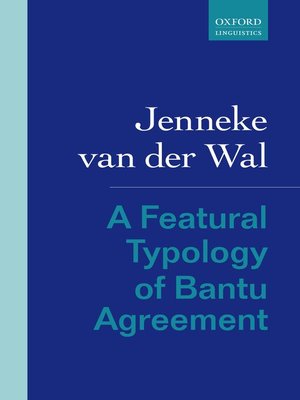
Sign up to save your library
With an OverDrive account, you can save your favorite libraries for at-a-glance information about availability. Find out more about OverDrive accounts.
Find this title in Libby, the library reading app by OverDrive.



Search for a digital library with this title
Title found at these libraries:
| Library Name | Distance |
|---|---|
| Loading... |
This is an open access title available under the terms of a CC BY-NC-ND 4.0 International licence. It is free to read at Oxford Scholarship Online and offered as a free PDF download from OUP and selected open access locations. This book explores variation in Bantu subject and object marking on the basis of data from 75 Bantu languages. It specifically addresses the question of which features are involved in agreement and nominal licensing, and examines how parametric variation in those features accounts for the settings and patterns that are attested crosslinguistically. Jenneke van der Wal proposes a novel syntactic analysis that takes into account not only phi agreement, but also nominal licensing and information
structure. A Person feature, associated with animacy, definiteness, or givenness, is shown to be responsible for differential object agreement, while at the same time accounting for doubling vs. non-doubling object marking - a hybrid solution to a long-standing debate. In addition, low functional
heads are assumed to be able to Case-license flexibly downwards or upwards, depending on the relative topicality of the two arguments involved. This accounts for the properties of symmetric object marking in ditransitives and for subject inversion constructions. The correlations between the proposed featural parameters reveal new striking patterns that provide evidence in favour of an emergentist view of features and parameters and against both Strong Uniformity and Strong
Modularity.







